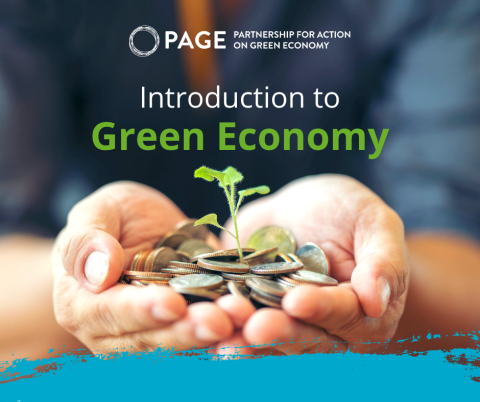
Introduction to Inclusive Green Economy
IMPORTANT: Please register directly on the course website: http://unccelearn.org/
Most of us agree that our economies and lifestyles need to embark on a greener development path.
But what does greening an economy mean? Which opportunities exist to advance sustainable development? What challenges lie ahead along this path?
You have already taken the first step on this journey by beginning to think about these questions. UN Secretary-General Antonio Guterres remarked that “those that will be betting on the inclusive green economy, will be the ones that have a leading role in the economy of the 21st century”. This free e-learning experience has been designed to equip you with a mental compass as you seek answers to basic questions about inclusive green economies. The course has been developed under the Partnership for Action on Green Economy (PAGE) which brings together five UN agencies – UN Environment, International Labour Organization, UN Development Programme, UN Industrial Development Organization, and UNITAR. PAGE works toward putting sustainability at the heart of economic policies and practices to advance the 2030 Agenda.
The course enables learners to familiarize themselves with the rationale and core concepts guiding an inclusive green economy. It discusses both opportunities and challenges at global and national level to achieve low-carbon, resource efficient and socially inclusive development.
After completing the course, participants will be able to:
- Describe the rationale and core concepts for realizing an inclusive green economy against business-as-usual practices
- Identify enabling conditions for greening national economies
- Outline principal opportunities and challenges in key sectors
- Provide examples of national strategies and planning to advance an inclusive green economy
- Distinguish international frameworks and initiatives in support of an inclusive green economy
The course is structured around five modules:
- Understanding where we are – The rationale for advancing an inclusive green economy
- Focusing on the instruments – Enabling conditions for structural change
- Sighting the destination – Key sectors with high greening potential
- Devising a pathway – Strategies and planning for reaching policy objectives
- A helping environment – International frameworks and initiatives to support an inclusive green economy
The course is self-paced and not moderated. It is divided into five modules to help reach the learning objectives. The modules are self-standing. While a completion sequence is proposed, learners can select modules based on individual preferences. Throughout the course, learners will be provided with references and publications on inclusive green economy if more in-depth study is desired. A glossary contains definitions of relevant concepts and technical terms.
Each module features an interactive lesson, video and quiz. The interactive lessons are completed with the purpose of achieving module-specific learning objectives, and contain around 30 slides of content supported by case studies, videos, external links and exercises. The lessons take approximately 1 hour to complete. The videos take the participants on a fictitious tour with the company of two good friends. These friends will relate economic, social and environmental circumstances they encounter in daily life to the inclusive green economy concepts and applications discussed in the modules. They are neither policymakers nor professors, but they have a genuine curiosity to understand how economies can be transformed to become more resource-efficient, equitable and low-carbon. The quizzes assess the achievement of the learning objectives for each module. They can be completed at any time. Each quiz can be attempted a maximum of three times. Once the five module quizzes are passed with at least 70% each, the learner can download a certificate of completion from the course home page.
Participants will be requested to provide feedback on the course by filling in a survey.
The course provides clear, concise and up-to-date information for anybody interested in obtaining a general understanding about inclusive green economies. The course should be of particular interest to the following audiences:
- Civil servants in national ministries, sub-national departments and local authorities
- Environmental managers in private sector and civil society organizations
- Faculty, researchers and students
- Interested citizens

